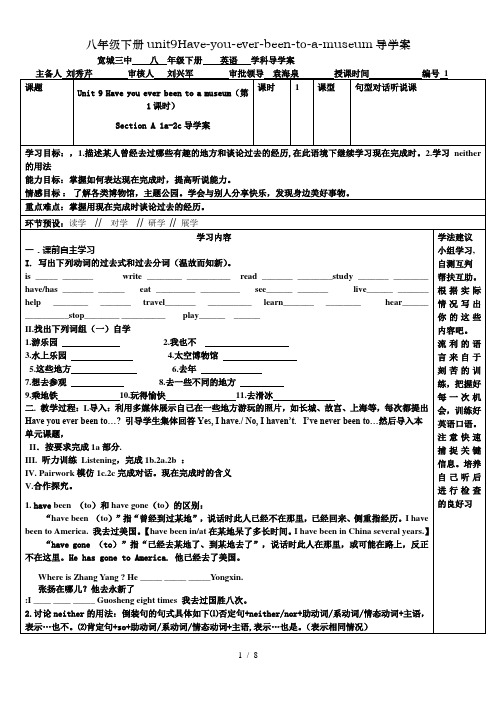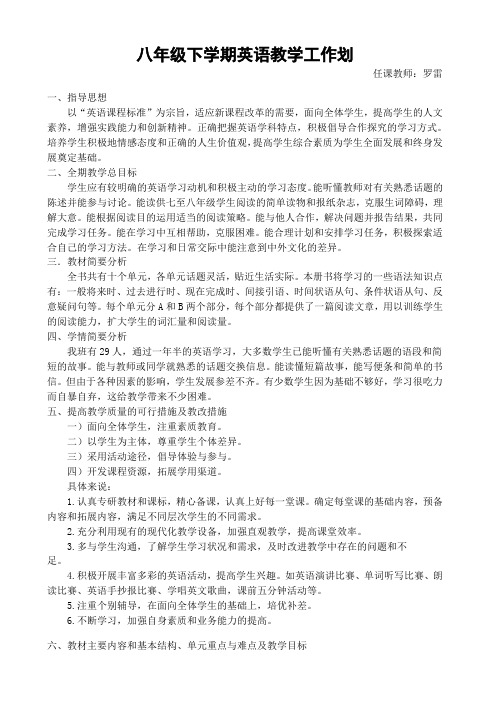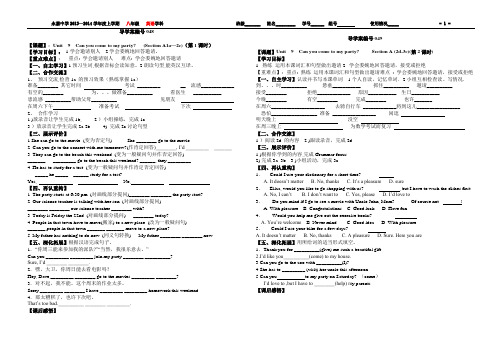八年级下册英语Unit9导学案
人教版八年级下册英语导学案

Unit1 Will people have robots?Section A period 1 (1a-1c)主备人:曾丝秀审核人:初二英语备课组学习目标:1、学会拼写单词will,robot,everything,paper和won’t2、学会运用will 表示一般将来时和能用will和won’t写出表将来的句型3、创设情景,让学生简单预测自己的未来学习方法:Reading,Listening and writing学习流程及措施:一、预习自学(一)通过预习,完成下列单词和词组的拼写1、将、会;要________2、机器人_________3、每件事情______4、纸,纸张_______5、在人们的家里_____________6、有个机器人__________7、在家通过电脑学习__________8、活到100岁__________9、在五年后__________10、在纸上________(二)根据首字母及句意完成单词1)R______ can do many things for people.2) There are some pieces of p______ on the desk,and you can write on them.3) E_____ is ready .Let’s begin.4) He u____ a pen to write.5)There will be more and more tall b______ in our city.二、研讨一)通过预习完成下列句子1、人们家中将有机器人。
People _____- ______ ______ in their homes.2、人们将不再用钱,每样东西都是免费的People ____ _____ ______. Everything____ ______ _____.3、将来书只在电脑上出现,而不会在纸上.Books _____ ____ ______ on computer, not _____ ______.4、孩子们将不去上学,他们将在家中通过电脑学习。
人教版英语八年级下册导学案

Unit4Section A一、学习目标:1) Important words: mad, anymore, message, suppose, hard-working2) Important phrases: watch soap operas, be supposed to do, first of all, pass on, sth. happen on …3) Important Sentences①She said she was mad at Marcia. ②She said she was having a party for Lana.③What happened on “Young Lives” last night? ④You are supposed to meet at the bus stop to return it.4) Grammar: 直接引语和间接引语二、学法指导:运用任务型学习,驱动学生掌握直接引语与间接引语之间的转化三、学习过程:Step1自学单元语法:(直接引语和间接引语)(一) 直接引语和间接引语的含义:引述别人的话时,一般采用两种形式:一是引用别人的原话,两边用引号标出,称为直接引语;二是用自己的语言转述别人的话,称为间接引语。
间接引语在句中实际上就是宾语从句。
(二) 直接引语变间接引语的方法:1.从句人称的变化:由直接引语变间接引语时,从句的主语人称要遵循一主、二宾、三不变的原则。
1)直接引语的主语是第一人称时,变为间接引语时要和主句的主语保持一致。
2)eg:①They said,“We will go there by bus”。
→They said they would go there by bus.3)②He said,“I am visiting my aunt next week.”→He said that he was visiting his aunt next week.2)如果直接引语的主语是第二人称,变为间接引语时要与主句的宾语保持一致。
八年级下册unit9Have-you-ever-been-to-a-museum导学案

宽城三中八年级下册英语学科导学案例如.A: Have you ever been to a zoo?B: Yes, I have./No, I haven’t.A: Me too./Me neither/Neither have I课堂小测:一.单项选择( ) 1. Have you ever seen him ________?A. agoB. two days agoC. beforeD. just no( )2.. _____ you ever _____ to an aquarium?Yes, we had a good time there.A. Have, goneB. Had, beenC. Have, been( )3.—Hello! May I speak to Kate?—Sorry, she isn’t here now. She _____ to Shanghai.A. wentB. has beenC. has gone( )4. —Tom doesn’t like the book because there is in it.A. interesting nothingB. everything interestingC. anything interestingD. nothing interesting5.---I have never been to a water park.-----A. Me ,too.B. Me, neitherC. Me also.D. Me both6.—I can sing the song in English.---A. So I can.B. So can I.C.I can so.D. Too can I7.Mr Green China for several years.A. has gone toB. has been toC. have been in课后反思:宽城三中八年级下册英语学科导学案主备人刘秀芹审核人刘兴军审批领导袁海泉授课时间编号2课时 2 课型课题Unit 9 Have you ever been to a museum(第2课时)(section A 2d and grammar focus4a--4c)学习目标:掌握并灵活运用本课的重点词汇。
八年级英语下册全册导学案

八年级下学期英语教学工作划任课教师:罗雷一、指导思想以“英语课程标准”为宗旨,适应新课程改革的需要,面向全体学生,提高学生的人文素养,增强实践能力和创新精神。
正确把握英语学科特点,积极倡导合作探究的学习方式。
培养学生积极地情感态度和正确的人生价值观,提高学生综合素质为学生全面发展和终身发展奠定基础。
二、全期教学总目标学生应有较明确的英语学习动机和积极主动的学习态度。
能听懂教师对有关熟悉话题的陈述并能参与讨论。
能读供七至八年级学生阅读的简单读物和报纸杂志,克服生词障碍,理解大意。
能根据阅读目的运用适当的阅读策略。
能与他人合作,解决问题并报告结果,共同完成学习任务。
能在学习中互相帮助,克服困难。
能合理计划和安排学习任务,积极探索适合自己的学习方法。
在学习和日常交际中能注意到中外文化的差异。
三.教材简要分析全书共有十个单元,各单元话题灵活,贴近生活实际。
本册书将学习的一些语法知识点有:一般将来时、过去进行时、现在完成时、间接引语、时间状语从句、条件状语从句、反意疑问句等。
每个单元分A和B两个部分,每个部分都提供了一篇阅读文章,用以训练学生的阅读能力,扩大学生的词汇量和阅读量。
四、学情简要分析我班有29人,通过一年半的英语学习,大多数学生已能听懂有关熟悉话题的语段和简短的故事。
能与教师或同学就熟悉的话题交换信息。
能读懂短篇故事,能写便条和简单的书信。
但由于各种因素的影响,学生发展参差不齐。
有少数学生因为基础不够好,学习很吃力而自暴自弃,这给教学带来不少困难。
五、提高教学质量的可行措施及教改措施一)面向全体学生,注重素质教育。
二)以学生为主体,尊重学生个体差异。
三)采用活动途径,倡导体验与参与。
四)开发课程资源,拓展学用渠道。
具体来说:1.认真专研教材和课标,精心备课,认真上好每一堂课。
确定每堂课的基础内容,预备内容和拓展内容,满足不同层次学生的不同需求。
2.充分利用现有的现代化教学设备,加强直观教学,提高课堂效率。
新外研版八年级英语下册导学案Module 10-On the radio(Unit1-Unit3)

外研版八年级英语下册导学案Module10 On the radioUnit1 I hope that you can join us one day一、学习目标:1.知识目标:(1)掌握下列词汇:director, avoid, background, background, national, international, interview, on air, presenter(2)掌握下列句型及短语:①Thank you for showing us around.②When it’s o n, it means we’re on air.③Come this way.④It gets crazy in here.⑤show sb. around ⑥on air⑦avoid doing sth.⑧make noise ⑨in the backgroun⑩ keep studying2.能力目标:能够听懂和读懂在广播中常用的词汇、短语和句型,并将节目与常用词汇对应起来。
3.情感目标:初步了解新闻传媒,了解媒体人的工作。
二、学习重、难点:1.重点:掌握宾语从句,掌握动词后接(to)+v.或v.ing的形式。
2.难点:掌握动词(to)+v.或v.ing的形式作宾语三、自主学习:1.词汇速记引领,带领(v)________ 避免,防止(v)________背景(n)__________国家的,国内的(adj)______direct(v) → _____(n)导演,主管,经理present(v) → __________(n)主持人2.短语互译be on________ avoid doing sth___________ make noise_____________come this way_____________ over there______________带某人参观______________(广播或电视)播出_________________四、学习过程:Step1. Warming-upFree talk: Do you listen to the radio?Do you like listening to the sports news programme?Do you like listening to the news programme?Do you like listening to music?Which presenter do you like best?Step2.Pre-listening1.Listen and check(√ ) the types of news you hear.culture government sports weather2.Listen again and complete the sentences.(1)Zhang Li reads ______________________________________ on Radio Beijing.(2)The president of Russia will stay in China for________________.(3)The match is between _______________and_________________.Step3.Fast-listeningListen and answer:1.What should we avoid doing in the background?2.Do they collect the latest national and international news in the newsroom?Step4.Careful-listeningListen again and complete the notes.1.When the red light is on,it means______________________________________.2.We collect_____________________________and write reports in the newsroom.3.You should________________________________if you want to be a presenter.4.This is also where we_________________________with the big sports stars.plete the sentences with the words in the box.1.Newspaper and television programmes often have__________with famous people.2.More and more ___________students are coming to China to learn Chinese.3.Every country has its own ________hero—a person who did something very important for the country and its people.4.Try to_______drinking too much tea or coffee, or you will not be able to sleep well.5.Could you speak a l ittle bit louder,please?It is very noisy in the ________________.Step6.Work in pairs.Ask and answer questions about the radio.1.What do you like listening to?2.What do you not like listening to?3.What programme did you listen to the last time you turned on the radio?4.What do you need to do if you want to be a presenter?nguage points.1.show v. 引领,带领【语境领悟】*Thank you for showing us around. 感谢你带领我们参观。
初中英语_Unit9 Reading Singapore—A Place You Will Never Forget!教学设计学情分析教材分析课后反思

Unit9 Reading Singapore—A Place You Will Never Forget!教学设计Writing 通过思维导图,谈论家乡日照,写一篇旅游广告。
认真聆听,根据问题提供的支架进行笔头输出。
PPT思维导图根据知识框架进行书面表达。
Homework 引导学生课下完成作业.Find moreinformation toperfect your travelad.认真聆听记下作业。
运用多媒体资源,学生课下搜索关于家乡的更多信息,并完善作文。
附: 上课思路Unit9 Reading Singapore—A Place You Will Never Forget!学情分析本课的教学对象是八年级的学生。
知识方面:对于八年级的学生来说,经过近两年的英语学习,部分学生已经有了一定的英语学习基础。
他们掌握了大量的语言技能,对英语文本的分析能力也有了一定的提高,但阅读技能的培养还待继续,所以在教学环节除了注重学生语言知识的学习外,还设置了不同的阅读微技能活动。
他们也掌握了一点国外日常生活中的不同传统特点,但总体上来说,还比较少。
心理方面:旅游这个话题与学生的生活紧密相连,也是他们很感兴趣的话题,如有机会,他们也很想出国亲身体验一些中国不同的旅游胜地,风土人情和传统生活。
但对于我们的学生来讲,出国的机会比较少。
比如新加坡,据了解没有同学去过。
基于现实生活,只能引导学生在课堂上发挥丰富的想象力,把课堂模拟成生活。
但大部分学生对于国外的旅游胜地,风土人情和传统生活所知甚少,因而词汇量和信息量可能会偏大,加之学生英语成绩的分化比较严重,所以要求学生能课前认真做好预习,借助网络和书籍,培养自学能力;在预设的任务中,也注意引导学生在交际中动态生成,学生有话可说,乐于合作分享.这样就有利于他们更好的运用课本知识,达到提高综合运用语言能力的目的。
Unit9 Reading Singapore—A Place You Will Never Forget!效果分析英语阅读教学的每个环节都有关系到阅读教学的整体质量。
人教版八年级英语下Unit9导学案

八年级英语下Unit9导学案Unit9 Have you ever been to an amusement park?备课人:*** 第1课时,现在完成时[1]学习目标1如何表达现在完成时[1]。
2现在完成时和一般过去时的用法及区别。
教学重点:现在完成时态。
教学难点:have been to sw 与have gone to sw 的区别。
学习过程一导学自主探究:阅读P 97-98I 现在完成时的用法1.表示_______________________________________某一动作对_______造成的影响或结果。
2.表示__________已经开始,持续到_________(包括―现在‖在内)的动作或状态,可以和表示______的时间状语连用。
II现在完成时态的结构构成:主语+ ________+ ________+ 其他。
( 当主语是第三人称单数时用____,其余人称用_____。
)否定式:主语+ _______/_______ + ________+ 其他。
疑问式: _______/_______ + 主语+ ________+ 其他?肯定答语:Yes, 主语+_____ /______. 否定答语:No, 主语+ _____/______.III过去分词:规则动词的过去分词构成与动词过去式相同;不规则动词需要特殊记忆.P120过去分词二课前准备自主先学:写出下列动词的过去式和过去分词1]is _____ _______ 2]write ________ __________ 3] read _______ ________4]study _______ ________ 5] have _____ _______ 6] eat ______ _______7]travel_______ _______ 8]speak_______ ________ 9]hear______ __________三交流探讨I 现在完成时常用的时间状语有:1.already (‖已经‖ 用于肯定句的助动词has/have和过去分词之间)yet (―已经‖ 用于疑问句的末尾处/ ―还‖ 用于否定句的末尾处)I have already read the book.______ you _____ the book ____? (变一般疑问句,并作肯定和否定回答)Yes, _____ ______. / No, I _____.I ____ _____ the book _____.(否定句)2.never (―从不‖ 用于助动词has/have和过去分词之间) ever (‖曾经‖ 用于疑问句和肯定句的助动词has/have和过去分词之间)____ he ever _____ ( read ) the book? No, he has never read it.3.just (―刚刚‖ 用于助动词has/have和过去分词之间)He _____ just _____( finish ) the work.He _______ ( finish ) the work just now.4.before以前(句尾)He ____________ ( see ) the film before.He _________ ( see ) the film two days ago.5.现在完成时+since+时间点或从句(一般过去时); 此划线部分用how long提问。
八年级上英语unit9导学案

导学案编号048【课题】:Unit 9 Can you come to my party? (Section A1a—2c)(第1课时)【学习目标】:1.学会邀请别人 2.学会委婉地回答邀请。
【重点难点】:重点: 学会邀请别人难点: 学会委婉地回答邀请【一、自主学习】1.预习生词,根据音标会读知意。
2.朗读句型,能英汉互译。
【二、合作交流】1、预习交流,检查1a 的预习效果(熟练掌握1a)准备________ 其它时间考试_________ __ 流感_____________ 有空的________ 为、、、做准备__________ 看医生___________患流感__________帮助父母__________ 见朋友在周六下午准备考试下次2、合作学习1.)放录音让学生完成1b,2.)小组操练,完成1c.3.)放录音让学生完成2a-2b 4) 完成2c讨论句型【三、展示评价】1.She can go to the movie. (变为否定句) She ________ go to the movie.2. Can you go to the concert with me tomorrow?(作肯定回答)________, I’d _________ _______3. They can go to the beach this weekend .(变为一般疑问句并作否定回答)_______ _________ go to the beach this weekend? ______, they _________.4. He has to study for a test. (变为一般疑问句并作肯定否定回答)_____ he _____ ______ study for a test?Yes, No,【四、再认重构】1. The party starts at 6:30 pm. (对画线部分提问)________ ________ the party start?2. Our science teacher is talking with her son. (对画线部分提问)________ ________ our science teacher ________ with?3. Today is Friday the 22nd. (对画线部分提问) ________ today?4. People in that town have to move(搬家) to a new place. (改为一般疑问句)_______ people in that town _______ _______ move to a new place?5. My father has nothing to do now. (同义句转换) My father ________ ________ now【五、深化拓展】根据汉语完成句子。
- 1、下载文档前请自行甄别文档内容的完整性,平台不提供额外的编辑、内容补充、找答案等附加服务。
- 2、"仅部分预览"的文档,不可在线预览部分如存在完整性等问题,可反馈申请退款(可完整预览的文档不适用该条件!)。
- 3、如文档侵犯您的权益,请联系客服反馈,我们会尽快为您处理(人工客服工作时间:9:00-18:30)。
Unit 9 Have you ever been to a museum(第1课时)Section A 1a-1c一、学习目标:描述某人曾经去过哪些有趣的地方和谈论过去的经历。
能力目标: 掌握如何表达现在完成时重点词语: amusement,neither ,space museum。
重点句子: 1) —Have you ever been to a museum?—Yes, I have. I went to the national science museum last year.2) Let’s go to one tomorrow.难点:掌握用现在完成时谈论过去的经历。
二、预习导学1.根据音标学习新单词,并记住中文意思。
2.熟读1a的词语和对话。
3.跟小组长读重点单词短语,并结对抽说中文意思。
三、自学检测(一)写出下列动词的过去式和过去分词is _____ _______ write ________ __________ read _______ ______ study _______ ________ have _______ ______ eat ______ _______start______ _______ live______ _______ help ________ ________ _travel _______ _______ say_______ ________ hear______ __________(二)翻译下面的词组。
一个科学博物馆___________________我也没___________________ 去某个不同的地方___________________玩的愉快___________________ 在水上公园___________________乘地铁___________________去滑冰___________________彩色电影___________________搭帐篷___________________听起来有趣___________________ 听起来是一个好主意___________________度周六下午的好方法___________________难点讲解:现在完成时1,表示过去的动作对现在造成的影响和结。
2,过去的动作持续到现在并且还可能继续进行下去。
构成 have/has+过去分词。
例如:我去过北京。
I have been to Beijing.他到上海去了He has gone to Shanghai’我在郧西呆了三个月。
I have been in Yunxi for 3 months.比较have/has been to 与have/has gone tohave /has been to 和 have/has gone to 都是指已经去了某个地方,但是 have /has been to 强调的是曾经去了某个地方并回来了; have/has gone to强调的是去了某个地方还没有回来。
--Have you ever been to Shanghai? --Yes, several times.-- Where is Mr. Wang??-- He has gone to Shanghai.认真琢磨,细心选择(体会现在完成时和一般过去时的区别)。
四、合作探究现在完成时(一)I.用法:现在完成时表示过去发生的动作对现在造成的影响或结果。
常与下列时间状语连用:just , already, yet, ever, never, before, several times。
现在完成时不能和表示过去的时间(如:yesterday, last, year, in 1976, two days ago, just now, when she came in 等)连用。
(1)现在完成时表示过去发生的动作对现在的影响。
I have studied English. 表示I know a little English.He has already come back. 表示He is here now.常与already, yet, just, recently, ever, never, before等表示不确定时间的时间状语连用。
(2)现在完成时表示从过去一直持续到现在的动作或状态。
She has been ill for 3 days. He has worked in the bank since 1990.此时,句中谓语动词通常是延续性动词,且常与表示一段时间的时间状语连用。
如:these days, all this year, recently, for +时间段以及since+时间点等等。
II. 构成:have / has +动词过去分词(1)has用于主语是第三人称单数,have用于其它人称。
(2)动词的过去分词构成分为规则动词和不规则动词。
规则动词在词尾加ed,其规则与过去式一样。
不规则动词要记住。
例如:take-taken, go-gone等。
III.区分五、展示1. 个人或小组读1a的单词和对话。
2.听录音完成1b。
3. 对话练习1c.六、学以致用选做题单项选择。
( ) 1、Have you met Mr. Li ______?A. just B. ago C.before D. a moment ago( )2、—Our country ______ a lot so far . —Yes . I hope it will be even ______A. has changed ; well B. changed ; goodC. has changed ; better D. changed ; better( ) 3、We ______ Xiao Li since she was a little girl .A. Know B. had known C. have known D. knew句型转换:1、They have been here since 2000. (对划线部分提问) have they been here?2、The old man _________ last year.He for a year. (die)(动词填空)3、Miss Gao left an hour ago. (同义句转换)Miss Gao ________ _______ ________ ________ an hour ago.4、Her mother has been a Party member for three years .(同义句)Her mother _______ the Party three years ________ .【总结反思】Unit 9 Have you ever been to a museum (第2课时)Section A 3a-3c一、学习目标:谈论过去的经历能力目标:运用Have you ever been to…?Yes,I have. No,I haven’t重点句子:. Have you ever been to…?Yes,I have. No,I haven’t难点:运用Have you ever been to…?Yes,I have. No,I haven’t二、预习导学1.看2a的地图。
2.熟读2d的句子。
3.跟小组长读2的句子,并结对抽说中文意思。
三、自学检测细心选择。
( )1. _____ you ever _____ to an aquarium? Yes, we had a good time there.A. Have, goneB. Had, beenC. Have, been( ) 2. I _____ my grandpa last Sunday.A. have visitedB. visitedC. was visiting( ) 3. She _____ Shanghai for a month.A. has come toB. came toC. has been in( ) 4. Mr. Hu died last year. He ____for several months alredy. A. has been dying B. has died C. has been dead D. died( ) 5. Fanny _____ TV at this time last Saturday.A. has watchedB. was watchingC. watched( ) 6 Have you ____ been to our town before? No, it's the first time I ___ here.A. even, have comeB. ever, comeC. ever, hav e come( )7. May ______ the book for two weeks.A. borrowedB. lentC. keptD. bought四、合作探究看2a中的地图,我们一起来编对话。
A: Have you ever been to ? B: Yes, I have. / No, I haven’t.A: When did you go there? B: I went thereA: How did you go there? B: I went there byA: Where are you going next week? B: I’m going toA: How are you going there? B:A: Who are you going with ? B:4. 讨论(1)Have you ever been to an amusement park?和I went to Fun Times AmusementPark last year.这两句话时态上有什么不同?为什么?_______________________________________________________________________ _(2)根据下面三个句子,讨论neither的用法:①Me neither, Let’s go to water city .②Neither answer is right.③Neither of them knows me.________________________________五、展示1.个人或小组读。
